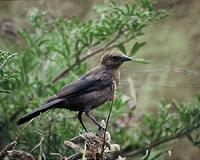 |
Manchester, UK (SPX) Mar 09, 2011 A tropical frog - the only one of its kind in the world - is providing conservationists with exclusive insights into the genetic make-up of its closest endangered relatives. University of Manchester scientists have allowed two critically endangered species of Central American Leaf frogs to interbreed, producing the unique frog - a hybrid of the two species. DNA tests using a harmless mouth swab showed that the two parent frogs were actually very closely related despite being different species. The findings are important because DNA tests on frogs of the same species but from different geographical areas have revealed considerable genetic differences. The scientists therefore suggest that conservation efforts should not only focus on each endangered species of frog but also on different populations of the same frog species. "Almost a third of the world's amphibians are threatened with extinction, so it is imperative that we identify distinct populations of critically endangered species before they are lost forever," said Andrew Gray, Curator of Herpetology at the University's Manchester Museum. "Through allowing interbreeding, and using DNA samples taken from the frogs' mouth, this work investigates the amount of variation both between and within species. More importantly, it is helping determine where conservation efforts should be concentrated and highlighting that some populations of critically endangered amphibians are in desperate need of further protection." In the past, an animal's appearance, including its colouration, defined it. But phylogenetics - the study of evolutionary relatedness of species through genetics - is becoming increasingly important in helping biologists identify separate species in need of conservation. The unique Leaf frog, which is maintained at the Manchester Museum, was bred from the two species Agalychnis annae, from Costa Rica and Panama, and Agalychnis moreletii, which is found in humid highland tropical forests ranging from southern Mexico to central Guatemala, El Salvador, Honduras and Belize. "Allowing the interbreeding of amphibians has proven particularly useful in providing evidence for the inheritance of genes, including certain colour pattern traits," said Andrew. "The study has shown that the two species used to produce the hybrid frog are extremely closely related. However, they should continue to be considered as separate, both for classification and conservation purposes. "It is also important to recognise the levels of variation in distinct populations of other closely related species. If conservation is our prime objective, it follows that separate populations of the same species should also be conserved for the future as distinct entities and future studies should focus on assessing the levels of variation in the different populations of these wonderful creatures."
Share This Article With Planet Earth
Related Links University of Manchester Darwin Today At TerraDaily.com
 Fossil Bird Study Describes Ripple Effect Of Extinction In Animal Kingdom
Fossil Bird Study Describes Ripple Effect Of Extinction In Animal KingdomGainesville FL (SPX) Mar 09, 2011 A University of Florida study demonstrates extinction's ripple effect through the animal kingdom, including how the demise of large mammals 20,000 years ago led to the disappearance of one species of cowbird. The study shows the trickle-down effect the loss of large mammals has on other species, and researchers say it is a lesson from the past that should be remembered when making conserva ... read more |
|
| The content herein, unless otherwise known to be public domain, are Copyright 1995-2010 - SpaceDaily. AFP and UPI Wire Stories are copyright Agence France-Presse and United Press International. ESA Portal Reports are copyright European Space Agency. All NASA sourced material is public domain. Additional copyrights may apply in whole or part to other bona fide parties. Advertising does not imply endorsement,agreement or approval of any opinions, statements or information provided by SpaceDaily on any Web page published or hosted by SpaceDaily. Privacy Statement |